Home to the Big Five, the region stands as one of the most biodiverse areas in southern Africa, containing nutrient-rich savannas that support large populations of ungulates and predators.
The Kruger to Canyons Biosphere Reserve in the Mpumalanga and Limpopo provinces of South Africa contains two key tourism sites, the Kruger National Park in the east and the Blyde River Canyon in the west. It also falls within the globally recognised biodiversity hotspot, the Maputaland-Pondoland-Albany, and encompasses three major biomes (savanna, afromontane forest and grassland). The biosphere supports a diverse network of land uses - conservation areas, communally managed nature reserves, communally grazed areas, commercial agriculture and forestry - thereby connecting biodiversity conservation with the sustainable development of the custodians of the land and resources. The high-quality water from the Blyde River feeds the lower lying communal rangelands in the west and sustains the ecology of the Kruger National Park.
The biosphere supports a largely rural and increasing population that depends upon its natural resources for their livelihoods and food security, mainly through cattle grazing and the harvesting of grasses, reeds, wood, fruits, and edible insects.
However, this landscape faces unique environmental challenges that influence the objectives and decisions of land management, including viral diseases in livestock, rangeland overgrazing, bush encroachment, and sand mining. It remains one of the most densely populated and economically challenged regions, with more than a million people living in conditions of poverty. Communal rangelands, which support livestock and indigenous and local community livelihoods, grapple with threats such as the loss of soil carbon, unrestricted grazing that results in overgrazing, and localised flooding.
Read more from our Vulnerability Assessment.
WHERE WE WORK
Kruger to Canyons Carbon Project 2022

OUR IMPACT
12 688
HECTARES UNDER IMPROVED MANAGEMENT
604
NATURE-POSITIVE JOBS CREATED
1 333
PEOPLE TRAINED in rangeland management
on the ground

© Conservation South Africa
Small, Micro and Medium Enterprise (SMME) Development
We provide support and mentorship to people from the Mnisi community to initiate investable, nature-friendly enterprises. These small-scale, local enterprises cover sectors such as livestock, fisheries, eco-tourism and the production of natural resources that deliver environmental and social benefits.

© Monica Mthabine
ICT centers & skill development
Information, Communication, and Technology (ICT) centers have been established at schools and youth centers in communities that are part of conservation agreements. These centers focus on providing reliable and fast internet connections and support youth in developing computer skills.
.jpeg?sfvrsn=edec2d9d_2&MaxWidth=960&MaxHeight=683&ScaleUp=false&Quality=High&Method=ResizeFitToAreaArguments&Signature=F2BF569477C300D9A49F9B75775214714FF0B312)
© Monica Mthabine
Environmental and social outreach
Our A20 hub is a well-kept sports facility that welcomes athletes to practice and compete in different sports. It also acts as a climate-smart knowledge facility, showcasing field restoration and techniques and climate-smart agriculture activities. Our Scouts programme, made of girl and boy scouts from the local communities, promotes environmental awareness and youth development.

